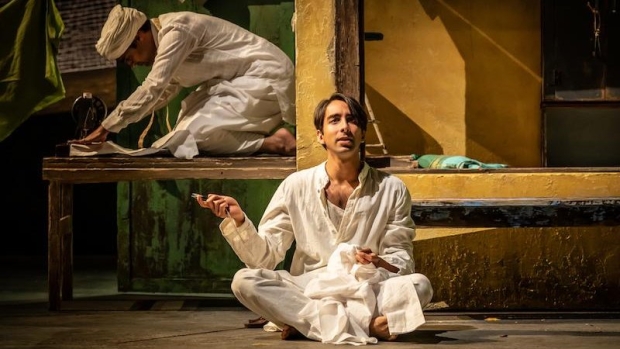The Father and the Assassin at the National Theatre – review
Anupama Chandrasekhar’s piece, telling the story of Nathuram Godse, continues through to 18 June

© Marc Brenner
A single, slim figure rises through the floor of the Olivier's stage under a spotlight and walks confidently towards us. "What are you staring at? Have you never seen a murderer up close before?". Smiling, warm and appealing, he is, he tells us, Nathuram Godse, the man who killed Gandhi, father of an independent India. But he isn't evil. He just wanted to be a free man.
The pure confidence of that opening is characteristic of this superb production of Anupama Chandrasekhar's terrific, stirring new play. It is both epic and easy, filling a difficult space with the sweep of history but, more importantly, with an engaging play of ideas, as it seeks to explain what makes a young man become a fanatic.
Its timing couldn't be more pertinent. There are statues being put up to Godse in India today as his extreme form of Hindu nationalism once more takes hold. The idea of uncompromising belief, and a lack of tolerance for people who think differently from you is sweeping politics all over the world. There's even a sharp – and rather funny – reference to Lord Mountbatten, who oversaw Partition, being a "hard Brexiter."
But Chandrasekhar's true achievement is to make these points, and to tell the immense story of India's journey to Independence, without ever getting bogged down in too much historical detail. She does this by putting the focus firmly on Godse, using the known facts of his life to build her structure – and then letting her imagination fly. The result is a play full of humour and humanity as well as analytical thought.
As played by an impressive Shubham Saraf, onstage throughout and holding the attention with a subtle mixture of intensity, anger and charm, Godse is a prime example of a troubled person in search of a cause. Brought up as a girl (his parents thought the boys of their family were cursed), he earned money in his childhood as a medium for a goddess, correctly predicting the future. As a young man, he came under the influence of Vinayak Savarkar, advocate of Hindutva (Hindu-ness), who rejected Gandhi's ideas of non-violent protest but also his equal inclusion of Muslims in any future state.
All of this is explored in a fluent series of scenes that unfold, under Indhu Rubasingham's propulsive, skilful direction, with engrossing momentum. Rajha Shakiry's design turns the stage into a rising and falling set of ramps, against a backdrop of rough strings, knotted like Gandhi's homespun. Within this setting, Rubasingham and her movement director Lucy Cullingford marshal a small cast of 19 into huge effects; as Gandhi's salt marsh gathers momentum, they stand victorious in a long line against the sky, until falling again and again, struck brutally down by British batons that we hear on Alexander Caplen's soundtrack. Siddhartha Kosla's music adds powerfully to the effect.
It's all cleverly paced, caring about detailed moments, quiet scenes, as well as the larger swell of events. In the same way, individual performances peek out from a strong ensemble. In particular, Nadeem Islam makes a notable impact as the school caretaker who teaches Godse to fit in yet suffers horribly for his kindness; Dinita Gohil is witty and vibrant as Godse's childhood friend who becomes Gandhi's helper; Paul Bazely makes Gandhi funny as well as wise.
It's a supremely assured cast, bringing to life a complicated story in a play that proves the value of history for understanding today.












